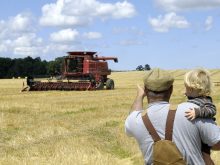Someone finally got around to doing a study on procrastination.
Piers Steel, a researcher at the University of Calgary, recently published a paper on the phenomenon, which he defines as the voluntary delay of an intended course of action despite expecting to be worse off for the delay.
Steel said societal levels of procrastination have been formally measured since 1978 and have been rising over the past 25 years. He estimates that 15 to 20 percent of the general population are procrastinators.
But if studies had focused on farmers, would that percentage hold true? If you think about it, there surely can’t be a more procrastination-averse group.
Read Also

Crop profitability looks grim in new outlook
With grain prices depressed, returns per acre are looking dismal on all the major crops with some significantly worse than others.
When season, soil conditions and weather are right for seeding, farmers must seed. When insect life cycles intersect with calculated threshold crop damage versus cost, they must spray. When crop maturity and weather are suitable for harvesting, they must harvest. Delays bring the risk and likelihood of financial losses. Mother Nature brooks no procrastination from farmers.
But there might be more to it. Steel hypothesizes that one cause of procrastination is low self-esteem. There shouldn’t be much of that in ag circles. Western Canada’s farmers, arguably the most efficient in the world, have survived adverse weather, low commodity prices, high input costs and hare-brained political policy. If they didn’t have self-confidence, there would be fallow land from here to Sault Ste. Marie.
Steel also suggests procrastinators tend to use an emotion-oriented rather than a task-oriented style.
Task-oriented? Farmers, step forward.
Impulsiveness might have a correlation to procrastination, Steel says. But when it comes to farmers, we’re talking about people who plan four-year crop rotations and buy farm implements that cost more than a house, neither of which is done without careful consideration. One might buy a new pair of rubber boots on impulse, but long-term planning is the norm.
Similarly, people with strong self-discipline are less likely to procrastinate. Look no further than the ag industry for people with this trait.
Finally, Steel hypothesizes that the tendency to procrastinate is reduced as people age. Given that most western Canadian farmers are over 30 and a sizable number are over 50, they’ve probably learned not to put many things off until next week or next month or next year.
Sure, there are some farm-related tasks that might tolerate occasional foot-dragging. If you get around to it, write and tell us what they are.














